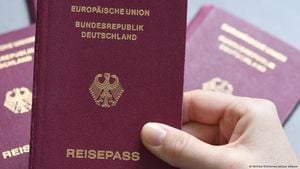The United Arab Emirates (UAE) has made a significant legal decision in the case of the killing of Israeli-Moldovan rabbi Zvi Kogan, sentencing three individuals to death and handing a life sentence to a fourth for aiding in the crime. This verdict was announced by the state-run WAM news agency on March 31, 2025, following a trial in the Abu Dhabi Federal Court of Appeals’ State Security Chamber.
Kogan, a 28-year-old ultra-Orthodox rabbi and emissary of the Chabad Lubavitch movement, had been living in the UAE for several years and was known for running a kosher grocery store in Dubai. His disappearance in November 2024 raised alarms, and his body was discovered shortly thereafter in Al Ain, near the Omani border. The details surrounding his death remain murky, as authorities have not yet disclosed a motive for the killing.
According to WAM, the prosecution presented a substantial amount of evidence during the trial, including detailed confessions from the defendants, forensic reports, post-mortem examination findings, and witness testimonies. The report stated, “The defendants had tracked and murdered the victim,” indicating a premeditated act of violence.
Three Uzbek nationals were arrested in Turkey and extradited to the UAE in connection with Kogan’s murder. While the UAE has not publicly attributed the killing to any specific group, Israeli officials, including Prime Minister Benjamin Netanyahu, have hinted at a broader geopolitical context, referring to an “axis of evil” believed to be responsible for the crime. This term has historically been used by Israel to describe Iran and its allies.
The diplomatic relationship between Israel and the UAE, established under the 2020 Abraham Accords, has faced strains due to the ongoing Israel-Hamas conflict. Despite this, ties have remained intact, with Israel maintaining both an embassy in Abu Dhabi and a consulate in Dubai. The UAE has seen a growing Jewish community since normalizing relations with Israel, featuring synagogues and kosher businesses that cater to the needs of Jewish residents and visitors.
While Israeli officials have not directly accused Iran of involvement in Kogan’s murder, they have suggested that Iranian intelligence operations in the UAE could be linked to the crime. Iran’s Embassy in Abu Dhabi has denied any connection to the incident, and the UAE has refrained from making such allegations. However, Western officials have expressed concerns about Iran’s ability to conduct intelligence operations within the UAE, given the significant Iranian expatriate population residing there.
Kogan’s funeral took place in Israel, where he was laid to rest following his tragic death. His case has drawn international attention, particularly due to the implications it may have for the fragile peace between Israel and the UAE amidst rising tensions in the region.
The UAE, an autocratic federation of seven sheikhdoms located on the Arabian Peninsula, has a population of approximately nine million people. Capital punishment is relatively rare in the country, but when it occurs, executions are typically carried out swiftly following the exhaustion of appeals. The UAE traditionally employs firing squads for executions.
As the investigation into Kogan’s murder continues, the case highlights the complexities of international relations in the Middle East, particularly in light of the ongoing conflict and the growing Jewish community in the UAE. Observers are keenly watching how this situation will unfold and what it might mean for future diplomatic engagements in the region.





